 October 12
October 12
Marginalized. On the margins. The entire undocumented and migrant community are marginalized, but some experience ever more barriers. I’m still trying to find a space for a family that needs disability access. Cramped hotel rooms and RV’s are not options for them. Neither is squeezing into already full homes of the few friends/family offering. (Which I learned by naively making lots of ableist assumptions that they graciously corrected) The limited options that others can make do with, are not accessible for a child in a wheelchair. Where do they go? I’m calling apartment complexes looking for ADA apartments but thus far no leads. Sean and I have discussed knocking out our downstairs bathroom wall to make it accessible, which we are happy to do. But I know, like most, a private, autonomous space is preferred. La mama is exhausted. So I’ll keep looking and asking for this. I’m going to be a squeaky wheel today with local apartments and supplement rent if we find something. Please pray we do.
On the margins are also the elderly. As I meet with families and hold space for the grief they have been working so hard to keep in, through tears, they ask me to also meet with their parents. The elderly parents are falling through the cracks because the aid is focused on families and homeowners.
As I met with the grandmothers, it was clear that beyond direct aid, what they really need is a chance to tell the story and let tears fall. Everyone is trying to keep it together for the children. The elders see the stress of their adult children with families, and they don’t want to be a burden. The love of a parent runs so deep. Las abuelas are helping to care for grandchildren, feed them, clean up after them, bathe them and still they feel uncomfortable depending on their adult children. Feel heartbroken to have to add any more stress at this time.
As I sit with them and we talk as over a cup of coffee, I can feel the entire social fabric that has been unraveled. The whole family systems of aunt, uncle, cousins, grandparents at the head. Everyone is separated, torn apart, sheltering wherever they can find it.
It reminds me of stories I’ve heard about how whole communities heal from disaster and war. How they come together in the village to prepare coffee or meals. And during this time, people tell their stories. Every day, tears, laughter and surprise at one’s survival are shared with those who understand fully. Far beyond western society’s individualized version of one on one counseling, whole communities innately know how to heal with their shared wisdom and resiliency. Our ancestors knew. Indigenous peoples all over the world still know how to heal.
I know this is true of our community too. This cultural fabric being precisely why so many lived in mobile parks together. I know that if everyone were not so displaced, separated and overwhelmed they would be tending to their marginalized, tucking them under the wings of comunidad.
I know there would be many cups of cafe among las abuelas. Many feasts among the familias. And I know there will be someday.
But right now it is not possible. Many cannot even make the food that speaks “home” to their small family because they have no kitchens.
Soon I will also do my part and offer talks and Trauma Release Exercises (TRE) designed for community healing. But stabilization, housing are still the necessary focus. Some of us are doing our best to fill the gaps. Please help me reduce the additional barriers the most marginalized face.
For more info on my approach, see my video here.
To Donate:
Go Fund Me: www.gofundme.com/f/almedafireslatinxrelief
Venmo: @sylvia-Poareo
Note:
I’ve been sharing my experience of the Almeda Fire in southern Oregon on my Facebook page, but I want to share it here so you can all walk with me on this journey. Click the “Almeda Fire” tag at the bottom of this post to read the entire series.
